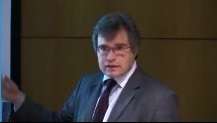Jason Crain
| Jason Crain | |
|---|---|
 Crain in 2014 | |
| Born |
Jason Crain August 24, 1966 New York |
| Residence | United Kingdom |
| Citizenship | United States |
| Fields | Applied Physics |
| Institutions |
University of Edinburgh National Physical Laboratory IBM |
| Alma mater | Massachusetts Institute of Technology |
Jason Crain (born August 24, 1966) is an American physicist based in the United Kingdom. He holds the Chair of Applied Physics at the University of Edinburgh[1] in Scotland and was appointed Director of Research at the UK's National Physical Laboratory (NPL) in London (as of 2015) where he previously held the role of Head of Physical Sciences (since 2008).[2] He is also Visiting Professor at the IBM TJ Watson Research Center in New York. His background is in the structure and physics of disordered matter at the molecular scale with a view to applications.
Early life
Born on August 24, 1966 in New York City, he obtained his undergraduate degree from the Massachusetts Institute of Technology in 1989, receiving the 1988 Orloff Prize for Research.[3]
Career
Crain was a research scientist at Fujitsu in Japan (1990) as one of the first interns of the MIT-Japan exchange programme ).[4] He obtained his PhD from the University of Edinburgh in 1993. Crain was appointed to a Royal Society of Edinburgh Research Fellowship in 1995,[5] and then appointed to the academic staff at Edinburgh. He was elected Fellow of the Institute of Physics in 2002. He was appointed Senior Visiting Fellow at the National Nuclear Laboratory in 2015.
Works
Crain has over 150 refereed scientific publications with an h-index of 34 according to the Web of Science. His most cited publications, each with over 100 citations, are:
- Molecular segregation observed in a concentrated alcohol-water solution S Dixit, J Crain, JL Finney AK Soper Nature (2002) 416:829-832 DOI: 10.1038/416829a
- Structure and elasticity of MgO at high pressure BB Karki, L Stixrude and J. Crain (1997) American Mineralogist82: 51-60
- Elastic instabilities in crystals from ab initio stress-strain relations BB Karki, GJ Ackland and J Crain (1997) Journal Of Physics-Condensed Matter 9 Pages: 8579-8589
- Reversible pressure-induced phase transitions in metastable phases of silicon J Crain, GJ Ackland, JR Maclean, and PD Hatton Physical Review B (1994) 50:13043-13046 Published:
- Methanol-water solutions: A bi-percolating liquid mixture L Dougan, SP Bates, R Hargreaves, JP Fox J Crain, JL Finney, V Reat,and AK Soper Journal Of Chemical Physics (2994) 121:6456-6462
- Structure and properties of Silicon-XII RO Piltz, JR Maclean, SJ Clark, PD Hatton and J Crain Physical Review B (1995) 52:4072-4085
- Cellular solid behaviour of liquid crystal colloids - 1. Phase separation and morphology VJ Anderson, EM Terentjev, SP Meeker, J Crain, and WCK Poon European Physical Journal E (2001) 4:11-20 DOI: 10.1007/PL00013680
Press coverage
His work has been covered on BBC News on HIV research;[6] ChemEurope on "DNA Zippers";[7] and Science Daily on "Electronically Coarse Grained Water"[8] "Towards the ultimate model of water" [9] and "Squishy transistors" [10]
References
- ↑ "University of Edinburgh Department of Physics".
- ↑ "National Physical Laboratory". ww.npl.co.uk/people/jason-crain.
- ↑ "MIT Department of Physics Awards".
- ↑ "MIT Japan Program".
- ↑ "Press announcement of RSE awards".
- ↑ "BBC News".
- ↑ "ChemEurope".
- ↑ "Quantum Model Helps Solve Mysteries of Water". http://www.sciencedaily.com/releases/2013/06/130604113431.htm.
- ↑ http://phys.org/news/2015-05-ultimate.html
- ↑ http://phys.org/news/2015-09-squishy-transistorsa-device-concept-fast.html